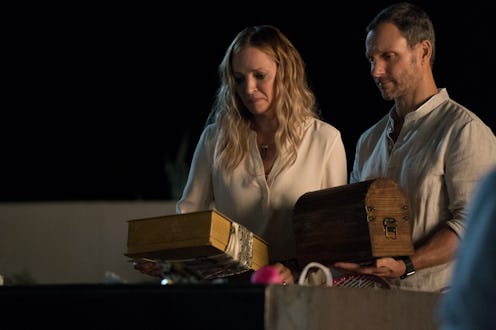
If you've seen the trailers for Netflix's new paranormal thriller, Chambers, you know that Uma Thurman and Tony Goldwyn play a very rich (and suspicious) couple grieving the recent death of their daughter. Goldwyn's Ben Lefevre is heavily involved with the Annex Foundation, a "new age spiritual center," and following his daughter's death, he turns there in order to cope with his grief. Inevitably, things begin to take a dark turn. It doesn't appear that the Annex Foundation from Chambers is a real organization, but it's certainly not the first time aspects of spirituality and faith have been used as a backdrop for horror.
Take some of the most iconic horror films of all time — everything from classics like The Exorcist and Rosemary's Baby to newer hits like The Conjuring and The Witch all rely heavily on biblical themes. And a scroll through Netflix's library yields plenty of horror projects about spiritual (but sinister) cults and rituals. As Kalyn Corrigan wrote for ComingSoon.net, horror can often be used as "a commentary on how religion can be used as a weapon if its power is wielded by the wrong people."
As we see all too often in the news, religious extremism, when misappropriated, can lead to acts of violence, and historically, there have been plenty of reasons for marginalized groups to feel ostracized or even threatened by organized religion. Plus, some aspects of religion are terrifying by nature — exorcism, for example, is a real practice that dates back centuries — while some biblical stories about the apocalypse or eternal hell are enough to make anyone squirm with fear.
Faith and horror also tend to grapple with many of the same huge, overarching ideas, like the nuances of morality and good versus evil.
"Horror films are some of the most moral films out there, because I think more than any other, it's the genre where you can have clear good and evil, black and white, without the gray," Craig Joseph, a former pastor who studied film at Northwestern, told the Canton Repository newspaper in 2011. "Also, it's one of the only genres that gives credence to the idea that there is a supernatural world. Because of that, you can get away with talking about religion and spiritual and invisible things more than any other genre."
On the same note, Timothy Milinovich, an associate professor of theology at Dominican University, told USA Today that both horror and religion want to examine "what is outside of us that is a threat, but also what is within us: rage and anger and jealousy and all these other things that are also corruptions – even the concept of guilt [and] the need for redemption."
Of course, such themes have had their share of criticism — some feel they're even anti-religious, and that they put an unfair stigma on those who participate in faith-based communities. "The opportunity [to dissect religion] may be there, but it's often squandered," James Davis wrote for the South Florida Sun-Sentinel in 2011. "Horror films typically have a powerful malevolent force, but little or no supernatural help on the side of good. Believers, in fact, are often shown as part of the problem."
Nonetheless, the horror genre will probably mine spiritual and religious stories for years to come — after all, they've been the base of some of the most iconic shows and movies to date. Now, Chambers is putting its own twist on this classic trope.